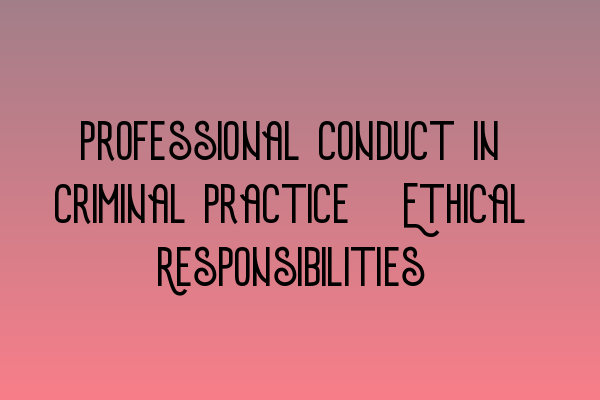Professional Conduct in Criminal Practice: Ethical Responsibilities
Welcome to SQE Criminal Law & Practice Law UK! As solicitors, it is our responsibility to uphold the highest ethical standards in our criminal practice. Professional conduct not only ensures the integrity of our profession but also protects the interests of our clients and the proper administration of justice. In this blog post, we will explore the ethical responsibilities that criminal practitioners must adhere to.
Ethics in the Criminal Justice System
The criminal justice system relies on the ethical conduct of all its participants to ensure fairness, integrity, and respect for the rights of the accused. As criminal solicitors, our duty is to act in the best interests of our clients while upholding the principles of justice.
One key ethical responsibility is maintaining client confidentiality. Our clients trust us with their most sensitive information, and it is our duty to safeguard that information to the best of our ability. We must ensure that no unauthorized disclosures are made, unless required by law or with the client’s informed consent.
Conflict of Interest
Avoiding conflicts of interest is paramount in criminal practice. We must never represent clients if there is a direct conflict between their interests and our own or those of another client. Such conflicts can compromise our objectivity and impartiality, undermining the trust placed in us as legal professionals.
It is crucial for us to assess potential conflicts of interest at the outset of any case. By conducting thorough conflict checks and obtaining proper waivers, we can ensure that our representation remains free from any ethical dilemmas.
Integrity in Advocacy
Professionalism and integrity are the cornerstones of effective advocacy. We must always present our clients’ cases honestly, without knowingly making false or misleading statements. Our duty is to the truth and the administration of justice, and we must never engage in any conduct that undermines these principles.
Furthermore, we must respect the integrity of the legal process. This means not obstructing or interfering with the administration of justice, avoiding frivolous or vexatious litigation, and complying with all court orders and procedures. By doing so, we uphold the dignity of the profession and ensure the fairness of the judicial system.
Continuing Professional Development
As legal professionals, we have a duty to maintain and enhance our knowledge and skills. Continuing professional development (CPD) is a crucial aspect of our ethical responsibilities. By staying up to date with changes in the law, legal precedents, and best practices, we can provide the highest level of representation to our clients.
SQE Criminal Law & Practice Law UK offers a range of informative articles and tutorials to support your CPD. Check out these related articles for valuable insights:
- Exploring the Impact of Frustration on Contractual Obligations: Legal Insights
- Elevate Your Knowledge with Contract Law Tutorials
- Interpreting Contractual Clauses: Unlocking the Hidden Meanings
- Legal Aspects of Business Contracts: Key Considerations for Entrepreneurs
- SQE Contract Law vs. Traditional Qualifications: A Comparative Analysis
Conclusion
Professional conduct is at the heart of our criminal practice. By adhering to ethically responsible behavior, we protect the rights and interests of our clients, maintain the integrity of the criminal justice system, and uphold the dignity of the legal profession. Continuous learning and adherence to our ethical responsibilities ensure that we provide exceptional representation to those in need.
For more information and resources on criminal law and practice, stay connected with SQE Criminal Law & Practice Law UK.
